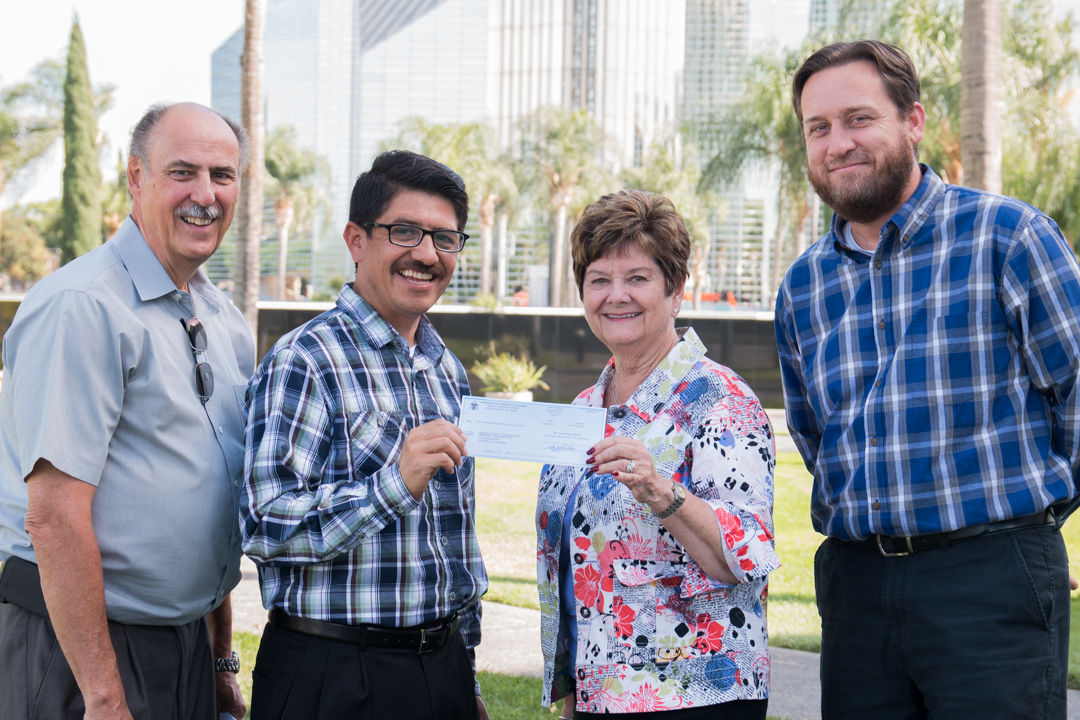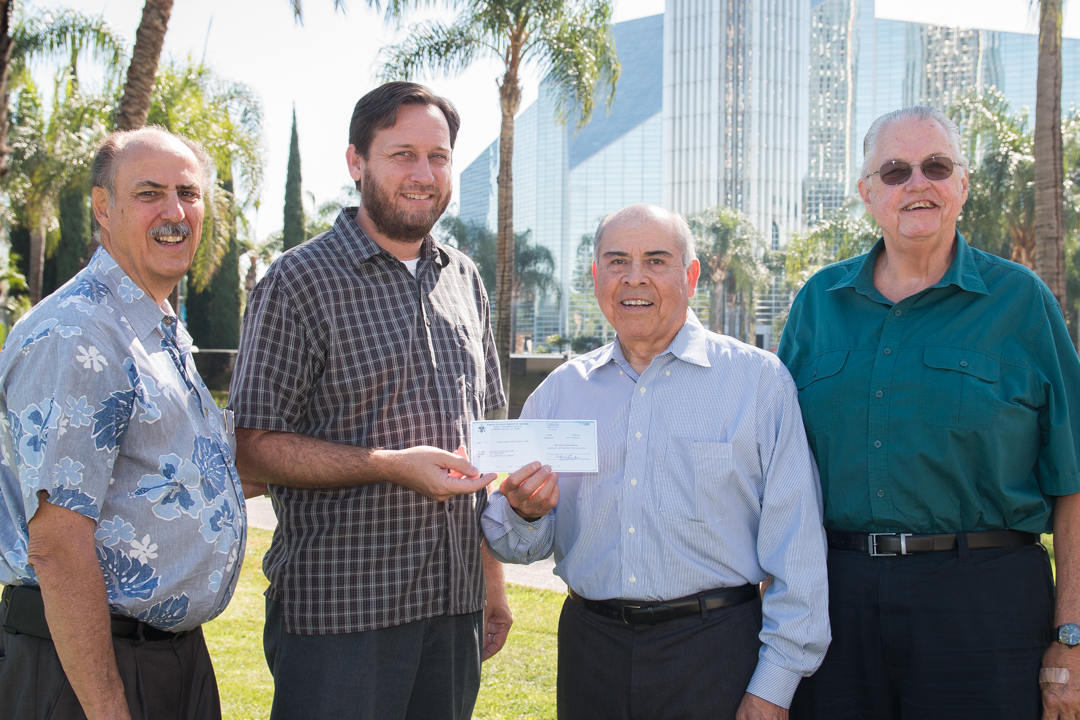Two nonprofit service organizations that work with low-income populations in Orange County recently were each presented with $10,000 in annual local grants by Shirl Giacomi, chancellor, Diocese of Orange and Dr. Greg Walgenbach, director, Office of Life, Justice & Peace and Deacon Jim Merle, coordinator of the Catholic Campaign for Human Development (CCHD), in two October ceremonies at Christ Cathedral. Funded by donations from Diocese of Orange California parishioners, the annual November Needs collection is a nationwide effort by CCHD asking the faithful to donate for both local and national grants that are used to fight poverty. The funds enable those affected to empower themselves through positive social and economic changes. Grants for the 2016 – 2017 fiscal year in Orange County totaled $20,000, according to Deacon Merle.
To apply, organizations are required to have an Internal Revenue Service 501 (c) (3) designation, be located in Orange County, be directed at serving residents of Orange County and have those affected by poverty in some way be on the decision-making boards. Organizations that benefited from participating in the application process are:
Justice in Education (J.I.E.) – (Children with Disabilities: Advanced Advocate Training), out of Santa Ana, was established in 2005 to help low-income, ethnically diverse families with disabled children in the 31 Orange County school districts who did not have legally adequate education programs. They are supported by relationships with the Legal Aid Society of Orange County and Catholic Charities.
J.I.E., since that time, has assisted more than 300 families to identify and evaluate the needs, as well as worked with them through formal school attendance review board, manifestation determination, mediation, due process and Superior Court hearings. In addition, J.I.E. has worked with many school psychologists, occupational therapists, speech and language pathologists, autism specialists and other educational professionals and parents to be trained to represent themselves in the special education process. Their $10,000 grant for 2016-2017 is to recruit and professionally train 10 special education leaders from the target population and others who in turn will train coworkers, clients and other parents.
Orange County Congregation Community Organization (OCCCO) – They are an adjunct of PICO of California and nationally that consistently offers community organizing for the impoverished since 1985. From 2008, they have received several local grants for work in affordable housing, education, organizing and promoting academic achievement and redistricting efforts for equality in political representation in Anaheim. Also in that time frame, they have received four national CCHD grants for their work in general organizing and leadership development; housing and crime prevention; education, healthcare and voter participation; homelessness and voter development; and immigration.
Their current grant is to fund Building Community Power through integrated Voter Engagement and Leadership Development so they can hold another Leadership Academy to train local leaders in the hard skills of integrated voter engagement in community organizing (25 leaders), electoral organizing (10 teams) and policy advocacy (10 research meetings with local officials).
CCHD was established 46 years ago in 1970 by the United States Catholic Conference of Bishops (USCCB) to fund programs used for the mitigation of poverty, betterment of social and economic conditions and easing of racial and ethnic tensions. The Campaign is based on the Catholic Church’s moral and social teaching traditions and asks organizations requesting funding to respect human dignity, to put the needs of the poor and vulnerable first, to acknowledge basic rights, duties and responsibilities, to work for the common good and to build and promote a civilization of love with a goal of peace in mind.
“Grants are broken into two main areas: Community Organizing and Economic Development.” Dr. Walgenbach explained. “The former works toward the elimination of the root causes of poverty and to enact institutional change. The latter creates income and/or assets for people living in poverty and for their communities. Both require that members living in poverty comprise at least 50 and 33 percent, respectively, of those who plan, implement and make policy, hire and terminate staff persons and have a leadership role on the Board of Directors.” Non-profit organizations receiving grants do not have to be Catholic.
Each year, millions of dollars are donated and then disbursed through local CCHD diocesan or archdiocesan boards under the auspices of the local bishop. In the Diocese of Orange California, local grants usually do not exceed $10,000. Twenty-five percent of all received funds are returned for local disbursement. The remaining seventy-five percent is disbursed by the national CCHD office in an amount not to exceed $75,000 with help of the local boards in reviewing applications, making site visits and providing general input for approval or rejection.
Eighty-nine cents out of every dollar received by CCHD goes directly to community empowerment, economic development and education programs that work to break the cycle of poverty. Each year CCHD distributes national grants to more than 300 projects based in local communities. In addition, hundreds of smaller projects are funded through the 25 percent share of the CCHD collection retained by dioceses.
“The local board of eight members works very diligently to read each application, schedule a site visit, review our findings, and then decide which organization we should recommend to the Most Reverend Kevin W. Vann, Bishop of the Diocese of Orange California, to receives funds,” Deacon Merle shared. “Each and every organization is worthy. The hardest part is contacting those corporations that did not make it in a given year and encouraging them to return next year for a possible grant.”
In an effort to assist numerous organizations applying for grants, corporations on the local level are allowed to receive funds for three consecutive years before sitting out for one year. National grantees are allowed to receive grants for six years, and then must wait a period of three years before reapplying.
Local applications are available on the diocesan website at www.rcbo.org under the Life, Justice & Peace office section and are due to be submitted no later than April first for each fiscal year for which they are applying. Check disbursements are made later that year.
“Presenting a check to a winning organization is what makes this all worthwhile,” Chancellor Giacomi commented. “The recipients’ faces light up and there are big sighs of relief in knowing they have more money to continue their efforts on behalf of assisting those in the grips of poverty. God smiles brightly that day and we hope for many more days to come.”


